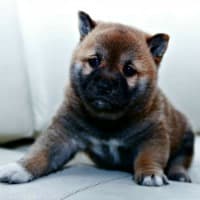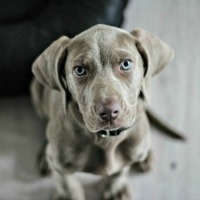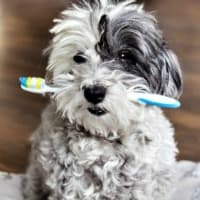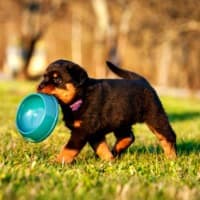Puppy Care Tips
Practical, straightforward puppy care tips to help you take better care of your little Rascal.
Taking care of a puppy can be frustrating, confusing, worrying and exhausting at times. It's also a whole lot of fun and games.
The tips on this page are designed to shorten your learning curve and help you skip some of the hassle, so that there's more time for the good stuff.
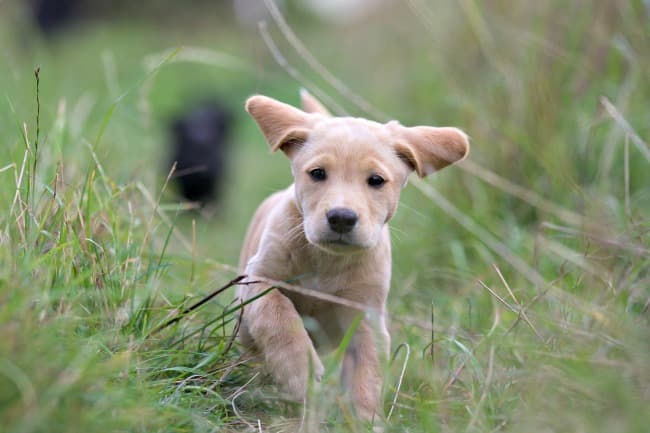
Puppy Care Tips: Feeding
Making sure little Rascal gets a healthy diet which is appropriate for his age/size is a very important part of your puppy care responsibilities.
What your puppy eats now will have a huge impact on his growth, development, health and even affects how long he will live.
There are three different ways you can choose to feed your puppy.
- Commercial puppy food
- Homemade puppy food
- Raw puppy food
Any of these methods can work well and provide little Rascal with the nutrients he needs.
#1 Use the food your puppy is familiar with at first
Find out what food your puppy has been eating at the breeder or rescue that you got him from and stick with that food for the first few days.
The stress of moving to a new home will put pressure on his immune system and a change in diet at the same time will only make that worse.
#2 Don't make dietary changes suddenly
If you make a sudden switch to a different puppy food, or a different method of feeding, your puppy will most likely get diarrhea.
Any dietary changes should be made slowly, over a period of about a week (or more if the change is a very big, fundamental one such as switching from commercial to raw).
Do this by adding a little of the new food to the familiar one.
Slowly increase the new and decrease the old over the following days until the changeover is complete.
#3 Do your research
Look into the different ways of feeding puppies before deciding which route you want to take.
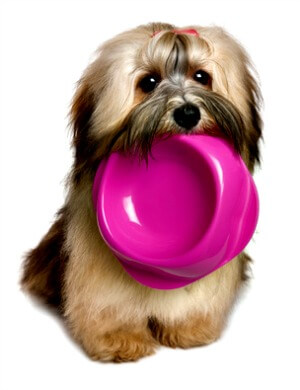
It needs to be a choice you are comfortable with and are confident will give your puppy the nutrition he needs, and that you can maintain.
If you choose to feed a commercial diet avoid cheap/generic puppy foods as they don't provide adequate nutrition.
Choose a premium food made from all-natural, human-grade ingredients which is formulated for puppies, or is an 'all life stages' formula.
If you choose to feed little Rascal homemade puppy food or raw puppy diet, make sure you know the ingredients which are safe and recommended, plus which supplements or vitamins/minerals need to be added and in what amounts.
You're not locking yourself into one choice for life, you can change method at any point as long as you do it gradually.
#4 Don't free-feed your puppy
Free feeding means having food available for your pup at all times.
This leads to 'grazing' and poor dietary habits in the long term. It's also not practical, or safe, for raw or home made dog diets.
Little Rascal should eat at certain times of the day and food bowls should be picked up in between meals.
Water should be freely available at all times though.
Puppy Care Tips: Housebreaking
Housebreaking a puppy (aka potty training) is something all puppy owners need to figure out, and fast.
Puppies don't realize that some places are okay to pee/poop and others aren't.
Little Rascal needs to learn what we expect from him, and we need to learn how to housebreak a puppy in a way he will understand.
#1 Use a crate
This is one of the puppy care tips that applies equally to puppies and dogs.
Crate training is the simplest, quickest and most effect housebreaking method for any age.
Dogs are naturally den animals and they instinctively try to keep their dens clean and go outside it to eliminate.
A crate triggers this den instinct (as long as it's not too big) which is why it works so well.
However, as soon as Rascal steps outside of his crate that instinct fades away, so you need to take him to his potty spot immediately.
#2 Puppies Need to 'Go' a LOT
Young puppies have minimal bladder/bowel control.
At 8 weeks Rascal need a potty break every 30 minutes to an hour during the day, and most likely once or twice during the night.
He'll also need to go when he first wakes up in the morning, after every mealtime, after he's taken a drink, when he wakes up from a nap, and right before he goes to bed.
If you don't take him outside to potty often enough you'll make the whole housebreaking process much more difficult.
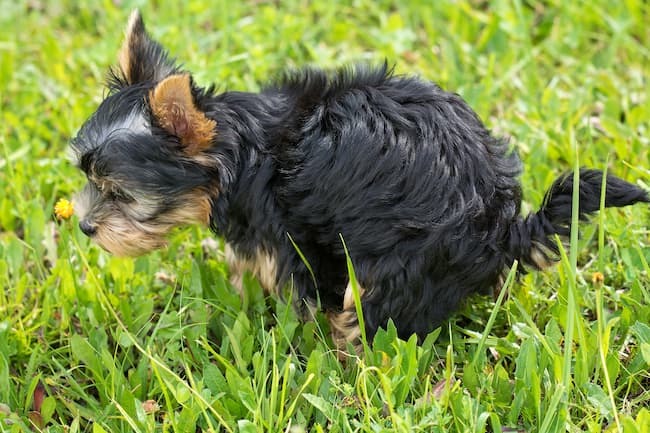
#3 Supervision is key
Dogs are creatures of habit, and bad habits form much more quickly than good ones (as we all know!).
Preventing little Rascal from developing the wrong potty habits is very important, and to do this you need to make sure he doesn't have the opportunity to pee/poop in the wrong places.
So supervise your puppy closely whenever he's not crated and be sure to take him outside at the first sign that he needs to go.
#4 Accidents will happen
Even if you do everything absolutely right, potty training accidents will happen from time to time.
If your pup has the opportunity to eliminate in the wrong location, it's on you, not him. He's only a baby and doesn't yet understand the process. It's up to you to help him learn.
Don't scold a puppy for a pee or poop that you didn't see him do. He won't have a clue what's wrong and will simply be scared.
If you see him start to squat, by all means say 'No' in a firm, but not harsh, voice while scooping him up and taking to his approved potty spot.
Give him time to finish up there (if there's anything left for him to finish once he gets there.)
If you use the crate and supervise properly, accidents will be occasional happenings and will dwindle and disappear as your pup matures and learns.
Puppy Care Tips: Training
The best way to train a puppy is to make learning a part of his everyday life.
Puppies are always eager to learn and anxious to please.
The things they learn as youngsters will stay with them for life as long as they get reinforced and practiced.
#1 Train early, and regularly
At 8 weeks old your little Rascal is like a thirsty sponge, he soaks up everything around him, including the lessons he's learning - both intentional and unintentional.
It's up to you to make sure what he learns is what you want him to learn (see the puppy care tips on housebreaking for an example of how puppies learn the wrong habits if you don't teach them the right ones).
Start with basic manners (such as not jumping or nipping) and basic obedience commands such as 'Sit'.
Practice these with him several times a day starting as soon as he feels comfortable and at home in his new environment.
#2 Keep at-home training sessions short
Your little Rascal is a baby, and he has a very short attention span.
For a very young puppy training sessions should be two or three minutes long.
When you're teaching basic commands, stick to one 'lesson' per session to being with and move at his pace.
Basic manners such as learning not to bite or jump need to be on-going lessons practiced whenever he shows that unwanted behavior.
As Rascal grows and develops, his attention span will also grow and his training sessions can become longer and more involved.
#3 Always use positive reinforcement
When you're training your puppy it's vital to reward him whenever he gets something right, and not to punish him if he makes a mistake.
Puppies naturally enjoy learning and want to make you happy.
Training sessions should be fun experiences so as not to squash his joy and willingness to learn.
Always end a session on a positive note, with a success on his part... even if it means making the last command one he has known for a while.
Ensure success and reward him well.
#4 Formal training classes are essential
I firmly believe every puppy should attend at least one set of group puppy classes.
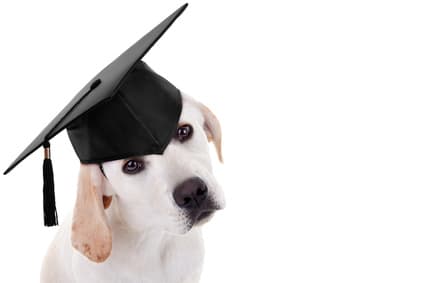
Puppy training classes have a host of benefits (for Rascal and you) outside of the obedience lessons that they teach.
A group class is a safe socialization experience for your little Rascal in a controlled setting.
Socialization is vitally important for puppies and builds happy, confident, friendly adult dogs.
Access to a professional dog trainer is important for you because you can ask questions about behavior or training issues that are bothering you, and get hands-on help for any problems that arise (both at home and at class).
Being with other puppy parents is also a fun socialization experience for you.
Visit my Puppy Training Tips page for more help and advice on training your little Rascal.
Puppy Care Tips: Health
Keeping your puppy healthy is very important, and knowing that your little guy's health is 100% dependent on you can be a little intimidating and worrying at first.
Providing Rascal with the right diet, environment, exercise and health care gives him the chance to live his best, healthiest and happiest life.
None of this is difficult to do, but it doesn't come without cost... both in terms of dollars and of time/effort.
If you're not willing, or able, to absorb those costs then puppy ownership is probably not right for you.
#1 Know the signs/symptoms of illness
Young puppies have immature immune systems and are prone to catching a number of illnesses/diseases.
They can get very sick, very quickly.
Being able to recognize the first signs of health trouble in your little Rascal could very well save his life.
There are a handful of symptoms that mean trouble is brewing, these include:
Any one, or combination of these could be a symptom of something minor, or of a life-threatening disease such as Parvovirus.
#2 Don't 'wait and see'
If your puppy has diarrhea and/or vomiting and seems tired, don't be tempted to wait and see how he is tomorrow.
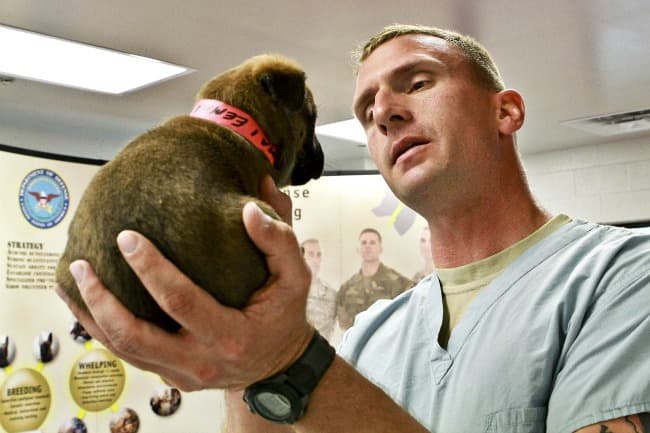
Parvo could have progressed to being fatal by that point.
If you've never experienced this disease you may think I'm being overly dramatic. I'm not.
Of course, little Rascal may simply have eaten something he shouldn't and have a bit of an upset tummy, but you can't tell the difference.
Your veterinarian can.
It's always better to be safe than sorry.
#3 Parasite prevention is important
Puppies can play host to a variety of different parasites, both internal and external, these include fleas, intestinal worms and skin mites.
Of course it's possible to treat parasitic infestations, but it's better to prevent them in the first place.
Some parasites transmit other diseases, or parasites (eg. fleas can cause worms, mosquitoes can cause Lyme Disease).
There are a whole host of parasite prevention drugs, unfortunately they are all full of toxic chemicals which can cause nasty side effects and even long term health problems.
If possible I recommend using natural products and methods of parasite prevention and treatment.
For severe infestations or if you feel a chemical-based product is necessary, use them sparingly and for the minimum time possible.
#4 Knowledge is power... so is preparation
In order to keep your puppy healthy you need to know what can harm him.
You also need to be prepared to deal with puppy health problems as they happen.
It's a good idea to:
- Be able to recognize the signs of illness
- Know what foods, household products, plants and other items are toxic to dogs
- Puppy proof your home, yard and garage
- Keep an Animal Poison Control Hotline and your veterinarian's telephone number on speed dial
- Have a dog first aid kit at home, and one in your car
You Might Also Like:
- Home
- Puppy Care Tips


